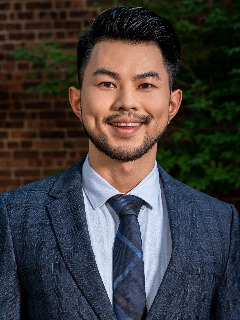Q+A with Lee Zhuge
Lee joined NZWRI in September 2023 as a research fellow. He completed a PhD in Economics at Boston University, specialising in labour economics. His research is dedicated to examining household-level inequality and discrimination, particularly in areas related to women's rights and LGBTQ+ rights.
When asking Lee to fill in the blanks "Economics is ___, ___, and ___ ", he said:
Economics is capitalism, socialism, and democracy.
1. What made you choose a career in economics?
I pursued an economics degree during my undergraduate studies, with a focus on finance. While I found finance intriguing, I began to question its broader societal impact, as it primarily deals with wealth redistribution. It became apparent to me that there were pressing real-world issues that demanded greater attention. Coming from a community grappling with significant social challenges, including wealth inequality, workers' rights, women's rights, and discrimination against marginalised groups, I felt a growing motivation to understand the root causes of these issues. It was this realisation that led me to choose a career in economics, as I recognised it as the path through which I could make a meaningful contribution to addressing these critical societal concerns.
2. Describe a recent project.
In my latest project, I explore the impact of degenderisation on collective labour dynamics within same-sex couples by introducing a revised Chiappori-style collective model. This study seeks to overcome the constraints of Becker and Gronau's time allocation theory, which inadequately explains labour supply patterns in same-sex relationships through comparative advantages alone. To fill this gap, I present a gender-neutralised collective model that incorporates evolving preferences, moving away from traditional gender norms. Within this innovative framework, men exhibit a decreased aversion to household tasks, while women display a reduced aversion to paid work, shedding new insights into the evolving dynamics of labour in same-sex partnerships influenced by changing perceptions of gender roles and expectations.
3. Describe the key results.
By controlling for comparative advantages as reflected in their hourly earnings, I aim to elucidate additional differences by exploring the shifting preferences and tastes that arise from being in a same-sex relationship. This helps to shed light on why a gay man, who possesses a comparable comparative advantage relative to his heterosexual partner, tends to allocate less labour towards market work and more towards home production. Conversely, a lesbian woman tends to contribute more labour to market work and less to home production compared to her heterosexual counterpart.
The analysis also provides extensive reduced-form evidence, indicating that being in a same-sex relationship, coupled with comparable comparative advantages, leads to a decrease in working hours for gay men and an increase in time dedicated by lesbian women compared to their heterosexual counterparts. While the impact on housework participation is less significant, the results also demonstrate a trend of increased hours for gay men and decreased time for lesbian women compared to their heterosexual counterparts.
4. What makes this research impactful?
My findings directly contradict the predictions of the Becker-Gronau model, enhancing our understanding of the distinct dynamics that shape economic behaviours and preferences within same-sex relationships. This paper also offers empirical evidence to substantiate the theoretical claims regarding time allocation and labour supply in same-sex couples. While there is ample evidence provided for time allocations in opposite-sex couples, the available literature for same-sex couples is presently limited, focusing primarily on their market work. The insights gained from this research shed valuable light on this topic and contribute to the broader comprehension of economic dynamics within diverse relationship structures.
5. What do you enjoy doing in your spare time?
In my spare time, I find joy in the blend of urban and natural experiences that New Zealand has to offer. Within the city, I appreciate the vibrant café culture, savouring flat whites, and indulging in brunches with friends at the numerous charming coffee shops. However, just a short drive away from the urban hustle and bustle, you'll discover breathtaking hiking trails and pristine beaches that provide a perfect escape into nature. Additionally, I have a keen interest in sports, and I try to learn more about the intricacies of rugby.
